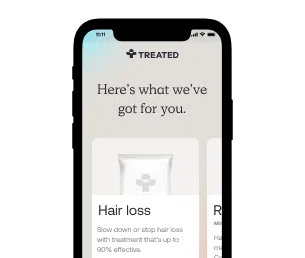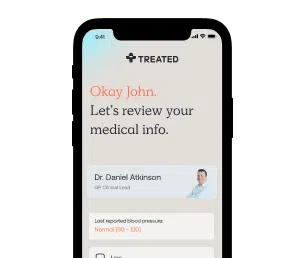IBS
Treatments for better digestive health.
Secure delivery
UK clinicians
You don’t need to struggle with the symptoms and pain of IBS. There are lots of different treatments that you can use to manage it.
Answer a few questions about your health, and get treatment recommendations from our experts. Order IBS treatment online and feel relief from your symptoms.
IBS stands for ‘Irritable Bowel Syndrome’ - an umbrella term that describes lots of different digestive issues. You might experience symptoms like stomach cramps, diarrhoea and constipation that can come and go, or last for longer periods of time.
It’s usually a lifelong condition that can be frustrating and embarrassing to live with, and can have a real impact on your day to day life. The causes of IBS are often unknown, but it can be caused by food passing through your gut too quickly or too slowly, an over sensitive digestive system, stress, anxiety and a family history of the condition.
While IBS can’t necessarily be cured, there are lots of treatments that you can take to help with your symptoms, as well as lifestyle changes that some people find reduce the severity of them.
Anyone can get IBS at almost any time of their life. Even if you haven’t previously experienced it before or have no family history of IBS, there’s no guarantee that you won’t develop it at some point. It’s more common in women than in men and it tends to start when you’re under 50.
Because IBS is a group of symptoms (some of which can vary quite a lot) rather than a single condition, it’s difficult to pinpoint exactly how common it is. It’s thought that it affects around 10% of the world’s population at any given time, and it seems to be more common in young people and women.

How we source info.
When we present you with stats, data, opinion or a consensus, we’ll tell you where this came from. And we’ll only present data as clinically reliable if it’s come from a reputable source, such as a state or government-funded health body, a peer-reviewed medical journal, or a recognised analytics or data body. Read more in our editorial policy.
The precise cause of IBS isn’t always known, partly because it isn’t just one condition.
The cause can be genetic, stress, anxiety, over sensitivity of the gut, certain foods, infections (such as a severe bout of gastroenteritis) or changes to your natural gut microbes. Though it’s often an intolerance to certain foods that triggers flare-ups.
There can also be other factors that play a role in IBS, including muscle contractions in the intestines, poorly coordinated signals between the brain and your intestines, and abnormalities in your nervous system. Early life stress, particularly in childhood, is also thought to have a connection to IBS. Research has also shown that the neurotransmitter: serotonin, may be important in the symptoms of IBS - by altering the function of nerve cells in the bowel and causing changes in pain sensation and bowel function.
The symptoms of IBS can vary from person to person. Some of the most common symptoms of IBS include:
These symptoms may get better or worse through the day, and usually link to whether you’ve eaten and if you’ve been to the toilet.
Some other symptoms of IBS that people experience include:
Unless it’s being caused by a more severe condition, like inflammatory bowel disease (IBD) or coeliac disorder (a severe intolerance to gluten in the body), it’s unlikely it will lead to anything more serious. If you have concerns about your symptoms then it’s always best to speak to a clinician.
Some IBS symptoms can lead to other problems. Constipation can lead to haemorrhoids, for example, and diarrhoea to dehydration and problems absorbing vitamins and minerals. These conditions and symptoms can have a major effect on your mental health, confidence and feeling in control of your life.

How we source info.
When we present you with stats, data, opinion or a consensus, we’ll tell you where this came from. And we’ll only present data as clinically reliable if it’s come from a reputable source, such as a state or government-funded health body, a peer-reviewed medical journal, or a recognised analytics or data body. Read more in our editorial policy.
As there are so many symptoms, the medications prescribed to treat IBS are also varied. These can include laxatives, diarrhoea treatments, and different ointments for symptoms like haemorrhoids that can happen as a result of IBS.
No, it all depends on what works for you. IBS can be something that you have throughout your life, so it’s often managed rather than cured. There are lots of factors to consider when considering the best medication for you.
For example, some laxatives should be avoided in the long term as these can cause worse problems than the symptoms you’re trying to treat. Our clinician could diagnose you with IBS as well as discuss treatment options with you. They can give you advice on what the best course of action could be, as well as guidance on managing your condition to support you with finding a treatment that’s best for you.
Many people find that making changes to their diet helps them to manage their IBS symptoms, especially if it’s related to a food intolerance. A food intolerance isn’t the same as an allergy, but the symptoms can be just as unpleasant.
The FODMAP diet - which stands for fermentable oligosaccharides, disaccharides, monosaccharides and polyols and excludes certain fermentable foods - is sometimes recommended for IBS. It can help to reduce digestive distress after eating certain types of food.
Trying to manage your stress levels can also be a great help when it comes to dealing with IBS symptoms. In fact, managing stress can be great for your overall physical and mental wellbeing.

How we source info.
When we present you with stats, data, opinion or a consensus, we’ll tell you where this came from. And we’ll only present data as clinically reliable if it’s come from a reputable source, such as a state or government-funded health body, a peer-reviewed medical journal, or a recognised analytics or data body. Read more in our editorial policy.
Have something specific you want to know? Search our info below, or ask our experts a question if you can’t find what you’re looking for.
Epidemiology of IBS. Gastroenterology Clinics of North America, 40(1), pp.1–10.
The Irritable Bowel Syndrome has Origins in the Childhood Socioeconomic Environment. Official journal of the American College of Gastroenterology | ACG, [online] 99(8), pp.1572–1578.
The role of serotonin and diet in the prevalence of irritable bowel syndrome: a systematic review. Translational Medicine Communications, 6(1).
A Diet Low in FODMAPs Reduces Symptoms of Irritable Bowel Syndrome. Gastroenterology, 146(1), pp.67-75.e5.

Ideal for constipation and stomach pain. Dissolve and drink one sachet 30 minutes before a meal.

Mebeverine effectively treats a range of IBS symptoms. It's like Colofac, but cheaper.

Fast acting symptom relief for IBS and period cramps. Can get to work in 15 minutes.

Symptom relief tablets and oral solution for irritable bowel syndrome.

Daily tablet treatment to relieve your IBS symptoms. Generic form of Buscopan.

Hard capsules for IBS and period cramp relief. Generic name for Spasmonal.

Registered with GMC (No. 4624794)
Meet Daniel
Registered with GPhC (No. 2202465)
Meet Sanjeda
Registered with GPhC (No. 2070724)
Meet Craig
Always read the leaflet that comes with your medication and tell us about any side effects you get.
We know health, but you know you.
Our experts tell you what’s safe, but you decide what’s best.
Answer a few questions and tell us about yourself. Get tailored advice from our clinicians so you can choose better.

Choose your treatment and how often you have it delivered.

We know things change. It’s the nature of life. We’ll check in regularly to make sure your treatment is still right for you.
Pause. Change. Skip. Start again. Any time you like.
Here are some other things we can help with.
Choose from our range of tablets and solutions. Get ongoing care and support from our experts.
Stop smoking treatments that can help you kick the habit forever, and reduce your risk of disease.
Tablets or injections. Tailored weight loss treatments combined with ongoing support from our experts.
We're making healthcare more about you. Sign up to our newsletter for personalised health articles that make a difference.
Disclaimer: The information provided on this page is not a substitute for professional medical advice, diagnosis, or treatment. If you have any questions or concerns about your health, please talk to a doctor.
We couldn't find what you're looking for.
Here's everything we treat. Or, if you're looking for something we don't have yet, you can suggest something.
If there’s a particular treatment or condition you’re looking for, tell us and we’ll look into it for you.
Submit your question here, or tell us if you’ve found an issue on our site.
We’ll get back to you very soon. We aim to respond to all queries in one working day.
You’re signed up to our newsletter. Keep an eye on your inbox for our latest update.
By clicking 'Subscribe now' you're agreeing to our Privacy Policy.
We’ve sent you an email asking you to confirm your email address.